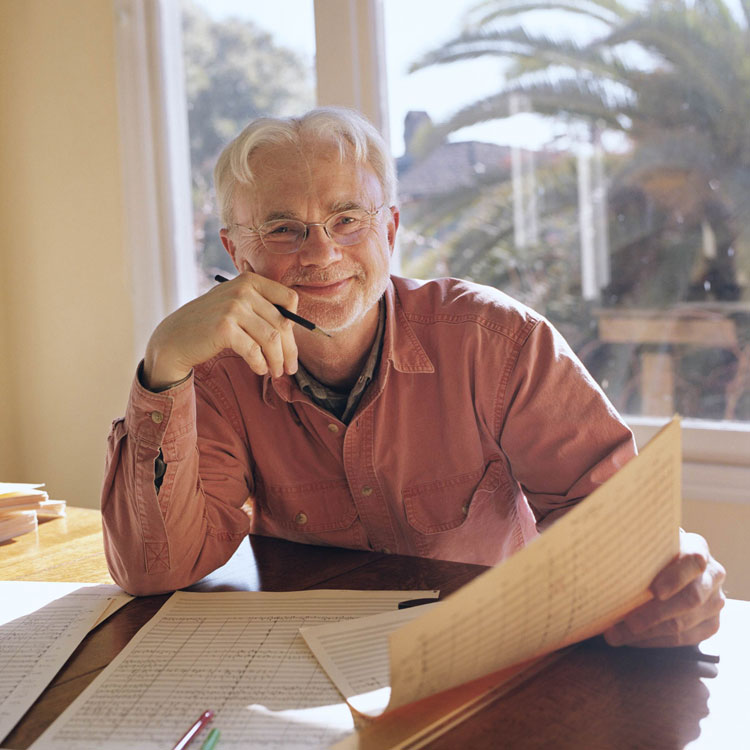
John Adams, contemporary and ‘post-minimalist’ (his phrase) composer turns 70 this week. One of America’s best known and most frequently performed composers, Adams has enjoyed a long-term relationship with the San Francisco Symphony – the longest partnership he has had with a leading international orchestra during his career, and one which strengthened over the years as he became an internationally known and highly respected composer.
The Adams/SF Symphony relationship began in 1978 when he was appointed the Symphony’s New Music Adviser. Then followed a three-year tenure as composer-in-residence – from 1982 to 1985 – and the creation by Adams of the orchestra’s New and Unusual Music series. A number of John Adams’ best-known orchestral works were written for – and premiered by – the San Francisco Symphony, including Harmonium (1981), Grand Pianola Music (1982), Harmonielehre (1985), My Father Knew Charles Ives (2003) and Absolute Jest (2012).
Two of Adams’ orchestral works have been recorded by Michael Tilson Thomas and the San Francisco Symphony on SFS Media, the orchestra’s in-house label. Their 2012 recording of Harmonielehre (commissioned by the Symphony) and Short Ride in a Fast Machine (commissioned by MTT) won the Grammy Award for Best Orchestral Performance in that year, and their most recent collaboration on the SFS Media label was the 2015 recording of Absolute Jest & Grand Pianola Music.
In the first of two concerts celebrating John Adams’ 70th birthday, conductor Grant Gershon – Artistic Director of the Los Angeles Master Chorale and Resident Conductor of the Los Angeles Opera – leads the San Francisco Symphony in the orchestra’s first performance of Adams’ Passion oratorio, The Gospel According to the Other Mary. The work was commissioned by Gustavo Dudamel and the Los Angeles Philharmonic in 2012, and premiered in May 2013.
With a libretto compiled by Peter Sellars from Biblical sources, and original texts by Hildegard of Bingen, Dorothy Day, Rosario Castellanos, June Jordan, Louise Erdrich and Primo Levi, The Gospel According to the Other Mary, relates the story of the last few weeks of Jesus’ life before his crucifixion, looking at events from the position of Mary Magdalene – a woman often regarded as marginalized – and also featuring her sister Martha and their brother Lazarus. Alongside the miracles and the resurrection, this work also draws parallels with current issues such as oppression, social justice and political unrest.
In a San Francisco Symphony video, John Adams describes how he asked his “long-time collaborator Peter Sellars to design or dream up a narrative for a passion play that would honor the Biblical story but also bring it into the present …. an oratorio that moves back and forth between the Biblical past and the immediate present”, drawing on the experiences of those times and how they relate to events that are taking place today.
Grant Gershon conducts the San Francisco Symphony and the San Francisco Symphony Chorus (director Ragnar Bohlin) in John Adams’ The Gospel According to the Other Mary at Davies Symphony Hall on February 16, 17 and 18. Also appearing in these performances are mezzo-sopranos Kelley O’Connor as Mary, and Tamara Mumford as Martha, tenor Jay Hunter Morris as Lazarus, and countertenors Daniel Bubeck, Brian Cummings and Nathan Medley.
For tickets and further information, visit the San Francisco Symphony website.
An hour before the performances on February 16 and 17, there will be a pre-concert conversation between John Adams, scholar Alexandra Amati-Camperi, and Stage Director Elkhanah Pulitzer.
On February 18, John Adams joins Alexandra Amati-Camperi for a pre-concert talk about his work.
See also: program notes by Thomas May on John Adams’ history with the San Francisco Symphony
Sources:
San Francisco Symphony notes and video
